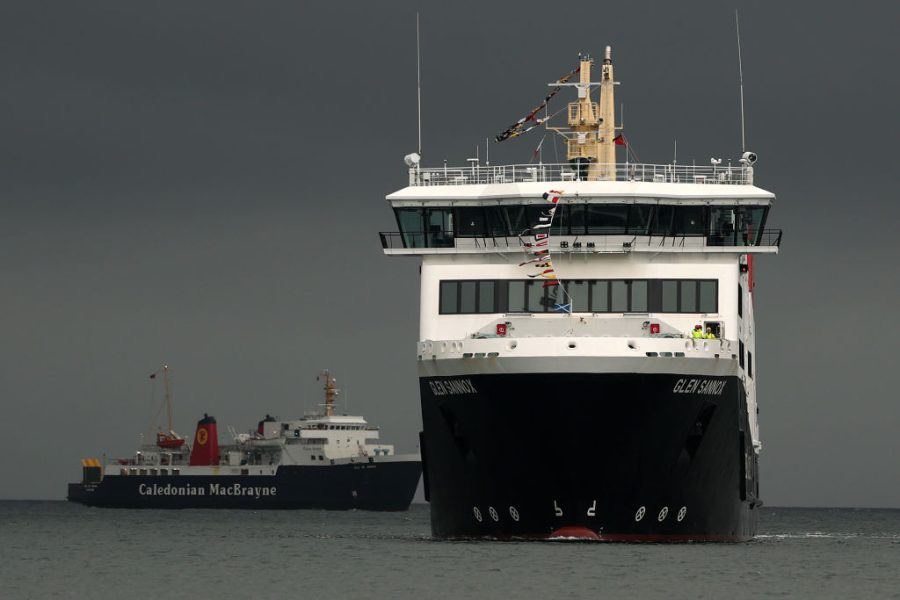Scotland’s troubled nationalised shipyard, Ferguson Marine, has failed in its bid to win a crucial order for seven small electric ferries that will operate on Scotland’s west coast, it was announced yesterday. Caledonian Maritime Assets Limited (CMAL), the state body in charge of ferries procurement, says it intends to award the contract for the new ‘loch class’ vessels to Polish firm Remontowa Shipbuilding. A budget of £175 million has been allocated to the build, which will include harbour and shore power upgrades.
Six shipyards were invited to tender for the contract, with five returning responses. ‘Bids were robustly assessed against technical and financial criteria, with a 65 per cent/35 per cent weighting, respectively,’ reports CMAL.
The contract award news has come as a bitter blow to Ferguson Marine
The first ferries are due to be delivered to state ferry operator Caledonian MacBrayne (CalMac) in 2027. Remontowa, which is based in Gdansk, has previously built the CalMac ferries MV Argyle, MV Bute and MV Finlaggan. It was runner up to Ferguson’s when the contracts for the controversial MV Glen Sannox and MV Glen Rosa ferries were awarded in 2015 – contracts that subsequently became the subject of a major scandal amid suggestions of contract rigging.
The contract award news has come as a bitter blow to Ferguson Marine, which had hoped to build Scotland’s new small vessels as part of a turn-around plan to make the yard commercially sustainable. In an unusual move, Ferguson issued a statement responding to its failure to win the contract. You might expect such a statement to come from the company’s chief executive, but its latest boss, John Petticrew, resigned a few days ago for ‘personal reasons’. He was in the role on an interim basis until a new long-term chief executive could be found following the sacking of David Tydeman in March last year.
In the absence of a chief executive, David Dishon, Ferguson’s chief financial officer, said the yard is ‘perfectly positioned’ for building the small electric vessels it will now not construct. He said:
Six of CalMac’s major vessels started life at our yard in Port Glasgow, including three ferries incorporating a low-carbon hybrid system of traditional diesel power and electric lithium-ion battery power – the first of their kind in the world at the time.
Dishon failed to mention the budget-busting delays associated with the Glen Sannox and Glen Rosa. Both had originally been scheduled to be delivered in 2018. The Glen Sannox finally went into service in January, although worryingly it was temporarily taken out of service a few days ago following the discovery of a crack in its hull. The Glen Rosa is still under construction and is at risk of further delays and cost overruns.
Revealingly, Dishon’s statement suggested UK yards can only compete if cost considerations are downgraded in the assessment process.
We are very proud of our bid, and although we priced it competitively, we were up against extremely tough competition from competing yards outside the UK, which benefit from significantly reduced operating costs and advanced capital investment programmes. The weighting for price will therefore place all UK yards at a disadvantage.
When he was Ferguson’s boss in 2023, Tydeman had gone to the Scottish government and asked for £25 million of investment in a new steel plating production line and other upgrades to raise productivity. He had argued investment in the yard at that stage would place it in a strong position to compete for the Scottish government’s small vessels contract as well as fulfil regular work on new ships for Britain’s navy, which could form a more stable revenue stream. It was hoped this combination would give the business a decent shot at becoming commercially sustainable. However, his proposal was rejected.
The Scottish government instead delayed decision-making until the following year, announcing in July 2024 that it would allocate £14.2 million to Ferguson for capital investment spread over two years. It now looks like it could be a case of too little, too late.
Cost overruns, ‘lifeline’ ferry services becoming unreliable, a string of chief executives, a major procurement scandal that still nobody has been held accountable for, and a financial black hole for Scottish taxpayers – the SNP Scottish government’s ferries fiasco seems never-ending. Eventually it will come to an end, though. The failure to win the contract to build Scotland’s new small ferries is another signal Ferguson Marine will never be commercially sustainable. It may well take a change of government at Holyrood for that reality to be accepted. Only then might we see the end of this sorry saga.






Comments